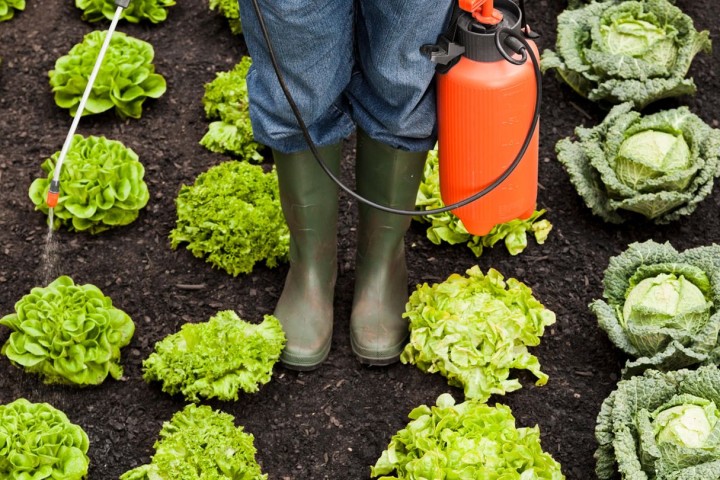Is the Pesticide Residue on Fruits and Veggies a Health Concern?

Key Takeaways
- A new study has suggested that a higher intake of produce with low pesticide residue is linked to a reduced risk of early death. However, the consumption of high pesticide residue produce was not found to be related to an increased risk of early death.
- While the research is interesting, the study had some important limitations.
- Experts say that you should not cut back on your produce intake out of pesticide exposure concerns. Instead, there are some practical steps that you can take to reduce the pesticide content of your food.
We're often counseled that eating more fruits and vegetables is one of the best things that we can do for our health because these foods are naturally jam-packed with fiber, vitamins, minerals, polyphenols, and other unique compounds.
However, a new study published in the journal Environment International raised the question of whether pesticide residues from produce need to be avoided to prevent potentially negative health outcomes—including the risk of early death.
What's the Problem With Pesticides?
Pests can ruin a beautiful juicy apple or a ripe and delicious peach. From insects and rodents to certain diseases, there are many natural forces that can wreak havoc on a crop, which leads to loss of revenue and possibly even less food available for human consumption.
Pesticides, or chemicals that help producers protect crops from destruction by pests, are one way to address the problem. While the chemicals are great at protecting our tomatoes and corn from harm, there are potential downsides to spraying them on our food sources.
For example, the findings from a 2019 study suggested there might be potential health risks from consuming foods with more pesticide residue, including negative cardiovascular and reproductive health outcomes.
However, other studies have not found evidence of significant risk (including cancer risk) associated with eating produce that has pesticide residue on it.
What's more, food is not the only way that we are exposed to pesticides in our lives; for example, a 2015 study showed that occupational exposure to pesticides might also be linked to an increased risk of early death.
The Recent Study's Findings
Research has consistently shown that eating a variety of fruits and vegetables is linked to positive health outcomes, including a reduced risk of early death when 5 servings of these foods are eaten per day. However, there has not been much research looking at whether the benefits also exist when people eat produce that has pesticide residue on it.
To look for a possible association between the pesticide residue status of a person's produce intake and their risk of early death from specific causes and in general, the researchers reviewed data on 137,378 women and 23,502 men who were part of several research cohorts.
None of the participants had cardiovascular disease, cancer, or diabetes at the start of the study.
The participants filled out food frequency questionnaires, which included their fruit and vegetable intake. The researchers also used data on pesticide use from the USDA. Taken together, the data gave the researchers a sense of the level of pesticides that participants consumed from produce in their diets.
Here are some key findings from the study:
- People who reported eating a least 4 servings of low-pesticide-residue fruits and vegetables per day had a 36% lower mortality risk than the people who reported eating fewer than 1 serving/day.
- The reduced risk was observed whether the cause of death was from cardiovascular disease, cancer, or respiratory diseases.
- While the participants' low-pesticide-residue produce intake was linked to a lower risk of early death, the researchers did not find evidence that the intake of high-pesticide-residue fruit and vegetables was linked to an increased risk of early death.
Study Limitations
The new study had several limitations. Taylor Wallace, PhD, CFS, FACN, Principal & Chief Executive Officer of Think Healthy Group, told Verywell that some of the research's limitations involved the participants that were included.
Wallace said that "the three cohorts used are very old and out-of-date to address this specific research question."
According to Wallace, the same cohorts have also been used by researchers to promote low-fat diets and the idea that eggs are bad for your health.
"If you can imagine, the types and quantities of pesticides used were very different in the 1990s, as was both conventional and organic farming," said Wallace, who concluded that the results of the study should be, as the saying goes, taken with a grain of salt.
Don't Limit Produce Out of Fear
Even if there was robust evidence that eating low pesticide residue produce is best for our health, cost, accessibility, or other factors prevent many people from following that dietary advice.
“While I appreciate the evolving research in this area, now is not the time for individuals to become even more alarmed and confused about the produce they are actually eating,” Elizabeth Shaw, MS RDN, CPT, a nutrition expert, author, and the owner of ShawSimpleSwaps.com, told Verywell.
Shaw added that “with one out of 10 Americans barely meeting the recommended intakes of fruits and vegetables in their diet, focusing on simple ways to encourage people to eat these foods is first and foremost what we should be doing.”
We need to consume more fruits and vegetables—that’s the bottom line.
— TAYLOR WALLACE, PHD, CFS, FACN
Previous research has supported the urgency for people to eat more produce (without specifying its pesticide residue level) to support their overall health. For example, a 2018 study suggested that low fruit and vegetable consumption is linked with an increased risk of death from vascular disease and cancer.
On the other hand, including a variety of fruits and vegetables in your diet has been linked to improved emotional well-being, vision health, and immune function.
"We need to consume more fruits and vegetables—that’s the bottom line," said Wallace, adding that "toxicity is in the dose. You can die from drinking too much water. Everything becomes toxic at some level."
Overall, most experts would not recommend that you limit or avoid fruits and vegetables because of fears about pesticides.
Reducing Pesticide Residue on Produce
It's important to know that organic does not always mean pesticide-free; organic produce may contain organic pesticides, while conventionally grown produce may contain synthetic pesticides.
Now is not the time for individuals to become even more alarmed and confused about the produce they are actually eating.
— ELIZABETH SHAW, MS RDN CPT
"While 'natural' may sound healthier, many times, the exact opposite is true," said Wallace. For example, copper sulfate (which is used as a fungicide) can be much more toxic compared to its synthetic alternatives.
If you do want to avoid pesticide residue on your fruits and vegetables, there are some steps that you can take:
- Grow your own produce. When you are managing how your food is grown, you have control over which (and how many) pesticides are used.
- Scrub and rinse your produce well well before enjoying it. You can also soak your food in a solution of baking soda and water to remove other residues.
- While you can peel produce before eating it to reduce your residue exposure, you will be missing out on some key nutritional benefits in the skin of fruits and veggies.
- Discard the outer layer of leafy vegetables (like lettuce and cabbage) before eating it.

